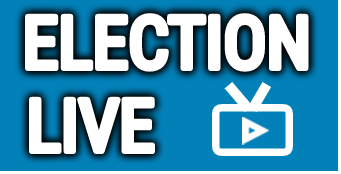CNN
In closing stretch, Trump is defying polls and betting that voters care more about immigration than the economy
Published
7 months agoon

By Steve Contorno, CNN
7 minute read
Published 5:00 AM EDT, Fri October 11, 2024

Migrants pass through razor wire after crossing the Rio Grande into El Paso, Texas, on February 1, 2024. John Moore/Getty ImagesCNN —
At last month’s presidential debate, Donald Trump claimed violent migrant gangs were “taking over” Aurora, Colorado, amplifying and exaggerating a disputed rumor his supporters had spread across the internet in the days leading up to his nationally televised face-off with Kamala Harris.
Now, the former president is set to hold a rally in Aurora, thrusting this midsize Mountain West city into the spotlight once again, along with the topic Trump hopes will decide this race: immigration.
Trump has all but staked his presidential campaign on convincing Americans that closing the border and kicking out those who illegally crossed it are the most pressing priorities for the country. It’s a pitch he has delivered with increasingly dark and offensive rhetoric that leans into stereotypes of foreigners from poorer countries.
He has claimed – over the repeated objections of state and local leaders, including from his own party – that Haitian migrants living in Springfield, Ohio, are “eating the pets” of the local residents. To the residents in a tiny Wisconsin town, he warned against what people from all over the world were “doing to the fabric, to the guts of our country.” This week, Trump espoused nativist arguments about some immigrants having “bad genes,” which cause them to commit crimes.
It’s a closing argument, though, that carries considerable risk. A steady stream of polls throughout the year and leading up to the final weeks of the presidential race have repeatedly affirmed that the economy is the issue of greatest concern to the most number of voters. In a recent CNN poll conducted by SSRS, more than 4 in 10 likely voters said the economy was the most important issue as they chose a candidate to lead the country. Only 12% said immigration ranked highest for them.
Meanwhile, the campaign shifted even more ad dollars to messaging about the economy, accounting for about 77% of its broadcast advertising spending in September.
In the face of this polling, though, Trump is betting on his gut, telling a Wisconsin crowd on Sunday, “I really don’t agree” that the economy will decide the election.
“I know they do all these polls, and the polls say it’s the economy, and the polls say very strongly it’s inflation, and I can understand it a little bit,” Trump said. “To me, it’s the horrible people that we’re allowing into our country that are destroying our country. And it’s the hardest problem to solve too.”
On comfortable ground
Illegal immigration is certainly comfortable terrain for Trump. He launched his first White House bid in 2015, railing against Mexican “drugs,” “crime” and “rapists” entering the country. He then centered his campaign on a promise to “build the wall” at the southern border and make Mexico pay for it, something he failed to fulfill as president.
Still, the 458 miles of new and replacement wall his administration built along the US-Mexico divide serve as a physical – yet unfinished – reminder of his long-standing fixation with keeping outsiders from entering the country illegally.
Trump regularly laments that as an incumbent in 2020, he could no longer galvanize support around the issue he believed won him the White House the first time. In his own retelling – which he often shares with supporters at rallies – “I wanted to talk about the border. My people said, ‘Sir, nobody wants to talk about the border anymore.’”
That is no longer the case as Trump seeks the Oval Office once again. The former president has resurfaced many of his promises from eight years ago, including a pledge to finish the wall and another to initiate the largest mass deportation in American history by deputizing local and state law enforcement to remove millions of undocumented people across the country.
It’s an issue he brings up in most public appearances – even at events that are purportedly centered on other topics. Speeches advertised as remarks on the economy, crime or inflation often begin and end with extended riffs on his favorite topic, at times overshadowing the message he was on hand to deliver.
For example, during a visit to Savannah, Georgia, that his campaign billed as “remarks on the tax code and US manufacturing,” Trump said the word “border” 29 times, outpacing mentions of “manufacturing.” In Tucson, Arizona, Trump stood in front of signage that said “Make Housing Affordable Again” but spent more time warning against migrants “taking Hispanic jobs, taking African American jobs, taking people that have been here a long time.” The first reference to “housing” came 30 minutes into his speech.
Trump has at times publicly panned his advisers for attempting to put such guardrails on his remarks.
“We’re doing this as an intellectual speech. We’re all intellectuals today,” Trump said in a mocking tone in August in Asheville, North Carolina, where he was supposed to speak about the economy. “They say it’s the most important subject. I think crime is right there. I think the border is right there, personally.”
Trump’s campaign pointed out that he has also held events centered on immigration, including a recent visit to Prairie du Chien, Wisconsin, that featured small-town Americans whose lives were upended by violent acts committed by undocumented individuals.
It also argued that immigration remains a top issues for many voters. A recent Gallup poll found 72% of Americans saying it was an “extremely” or “very” important topic – the highest point in the organization’s survey going back two decades. However, much of that is driven by Republicans, 63% of whom said the issue was “extremely” important to their choice in November.
That poll also showed independents split between Trump and Harris over who would handle the issue better.
Harris has lately sought to cut into Trump’s perceived strength on the issue. In late September, she made her first visit to the US border as a presidential candidate. In a town hall Thursday hosted by Univision, she accused Trump of tanking a bipartisan border security bill earlier this year, asserting he wanted “run on a problem.”
“Donald Trump found out about that bill, realized it would be the solution, and told them not to put in on the floor for a vote because he would prefer to run on a problem, instead of fixing a problem,” Harris said. “Real leadership is about solving problems on behalf of the people.”
‘A bloody story’
There should be no misconceptions about Trump’s appearance in Aurora on Friday, which his campaign announced in a press release saying, “Kamala’s border bloodbath has made every state a border state.”
How Aurora became a flashpoint in the race is illustrative of the speed at which online right-wing fixations enter the mainstream. Trump’s supporters seized footage from an apartment complex in the city that captured men wielding guns walking down hallways, in one case kicking open a door, followed by several women and small children.
The images rapidly spread around social media, with Trump supporters claiming they depicted Venezuelan gangs taking over an apartment complex. The building’s owner appeared to verify that description, but the city said the substandard housing conditions maintained by the landlord were the issue, not migrants. Meanwhile, local police have encountered some gang activity tied to a Venezuelan group, but rejected theories that the gang has taken over any buildings in the city.
That didn’t stop Trump, though, from seizing on the episode and escalating the falsehoods by claiming that Venezuelan gangs were taking over swathes of Colorado. He then foreshadowed a violent intervention if he is elected.
“You know, getting them out will be a bloody story,” he told supporters at a Wisconsin rally last month.
After Trump mentioned Aurora in the debate, the city’s mayor Mike Coffman, a Republican former congressman, said in a statement that the “overstated claims fueled by social media and through select news organizations are simply not true.”
Trump had similarly planned a visit to Springfield, Ohio – another city besieged by right-wing conspiracy theories about its migrant population – but backtracked after local authorities warned of the damage it would do to the community.
Coffman, though, told a local Colorado news outlet that he welcomed Trump’s visit.
“If he comes here, I see it as an opportunity to show him the city,” he said, “and break the narrative that this city is out of control when it comes to Venezuelan gangs.”
CNN’s David Wright, Caitlin Stephen Hu, Rafael Romo and Belisa Morillo contributed to this report.
You may like
-
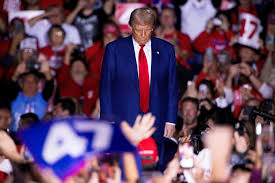

Trump gains with Hispanic men, Harris up with white women, Reuters/Ipsos polls show
-
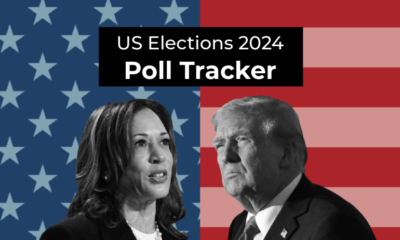

Trump vs Harris: Who is leading in US election polls?
-
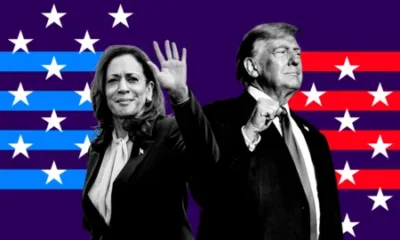

US election polls: Who is ahead – Harris or Trump?
-
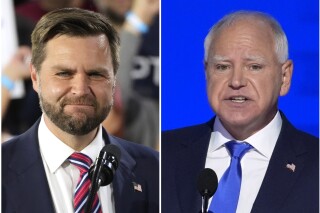

What polls show about Tim Walz and JD Vance before Tuesday’s VP debate
-
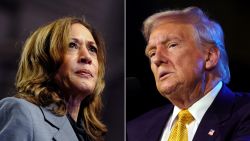

CNN Poll: Harris and Trump locked in exceedingly close presidential race
-
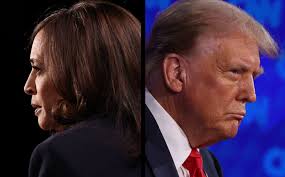

Harris vs. Trump: Who is leading the polls?
-
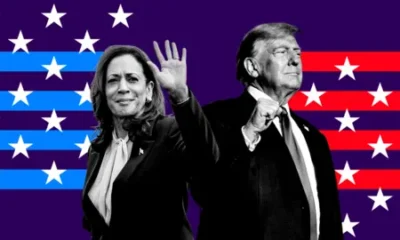

What do post-debate polls say about Harris v Trump?
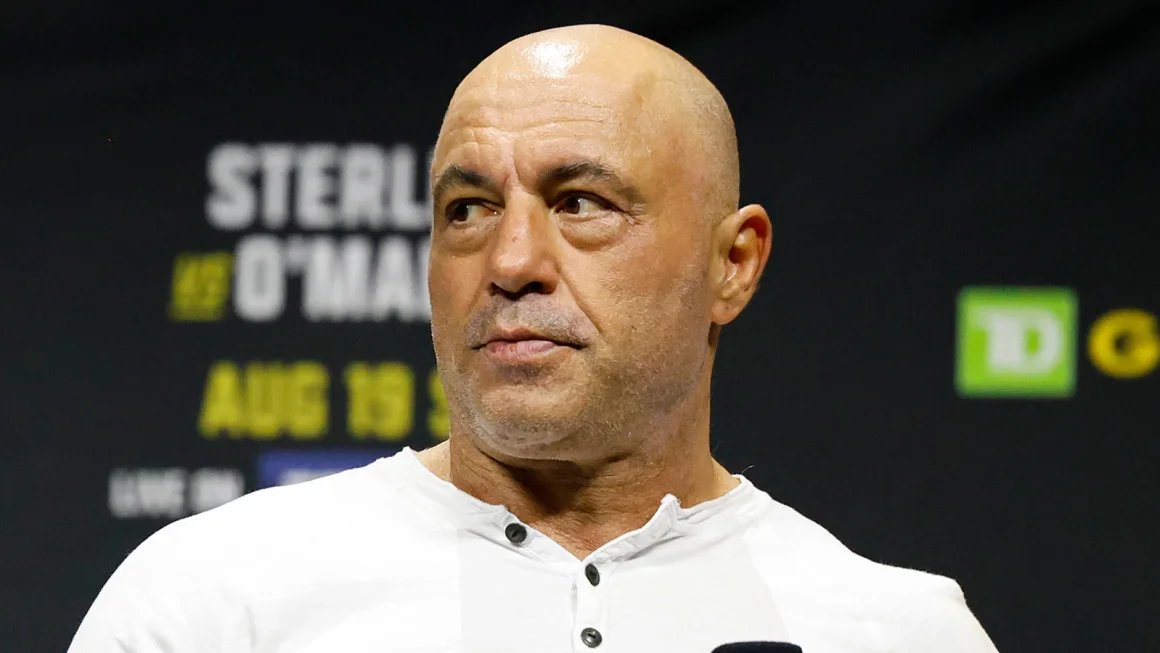
By Alayna Treene and Kate Sullivan, CNN
2 minute read
Published 9:43 PM EST, Mon November 4, 2024

Joe Rogan is seen at the ceremonial weigh-in for the UFC 292 mixed martial arts event, Friday, Aug. 18, 2023, in Boston. Gregory Payan/AP/FileCNN —
Popular podcast host Joe Rogan officially endorsed Donald Trump on the eve of the election, a move Trump’s team swiftly touted as a major win in the final hours of their campaign.
Rogan on Monday released his latest podcast featuring a two-and-a-half-hour interview with billionaire X owner and top Trump surrogate Elon Musk. Rogan then posted on X: “The great and powerful @elonmusk. If it wasn’t for him we’d be f**ked. He makes what I think is the most compelling case for Trump you’ll hear, and I agree with him every step of the way.”
“For the record, yes, that’s an endorsement of Trump. Enjoy the podcast,” he added.
The endorsement comes just weeks after Rogan interviewed Trump on “The Joe Rogan Experience,” an interview that was months in the making for the Trump campaign and viewed widely by the former president’s advisers as the crowning achievement of their media strategy to target young men and low-propensity voters by having Trump appear on podcasts catering to the demographic.
Trump, who was onstage in Pittsburgh, Pennsylvania, for his penultimate rally when Rogan made the endorsement, swiftly touted the development.
“It just came over the wires that Joe Rogan just endorsed me, is that great. Thank you, Joe. That’s so nice. And he doesn’t do that, he doesn’t do that stuff,” Trump said.
Trump said, “And he tends to be a little bit more liberal than some of the people in this room.”
Last week, Rogan posted on X that he had declined an offer from Vice President Kamala Harris’ campaign to do an interview.
“Also, for the record the Harris campaign has not passed on doing the podcast. They offered a date for Tuesday, but I would have had to travel to her and they only wanted to do an hour. I strongly feel the best way to do it is in the studio in Austin,” Rogan said. “My sincere wish is to just have a nice conversation and get to know her as a human being. I really hope we can make it happen.”
The Harris campaign declined to comment on Rogan’s post.
CNN
Trump describes US as an occupied country in dark closing message focused on immigration
Published
6 months agoon
November 5, 2024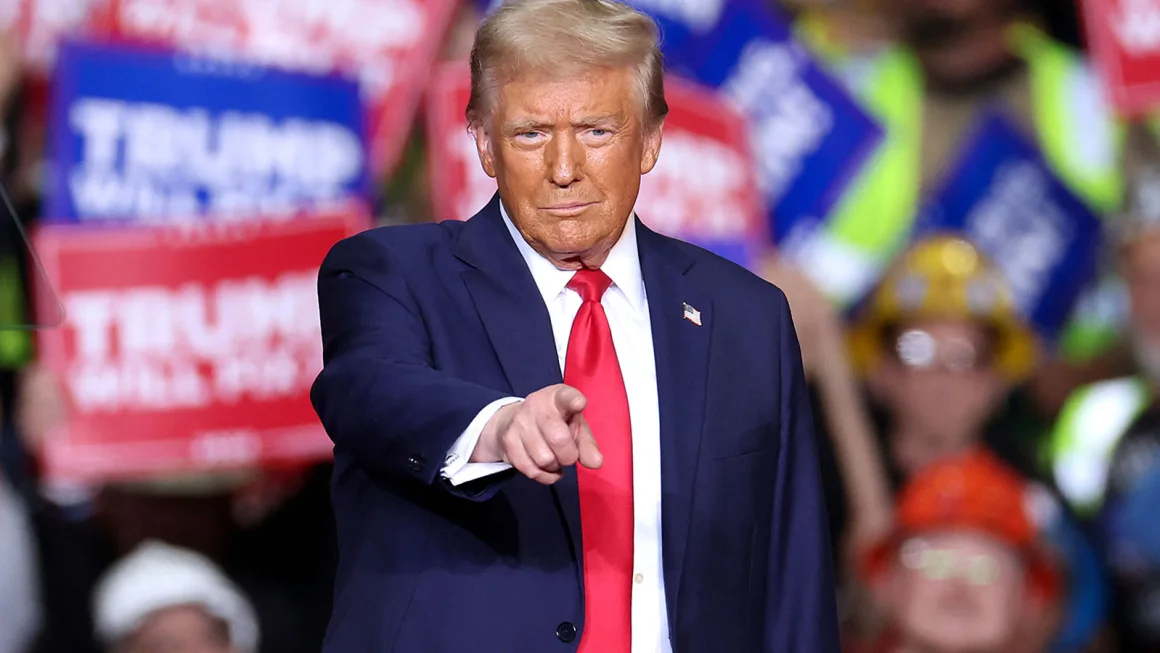
By Eric Bradner and Kate Sullivan, CNN
4 minute read
Updated 2:10 AM EST, Tue November 5, 2024

Former President Donald Trump gestures during a campaign rally in Pittsburgh, Pennsylvania on Monday, November 4. Charly Triballeau/AFP/Getty ImagesCNN —
Donald Trump described the United States as an “occupied country,” pointing to both undocumented and legal migrants as he pledged Monday to “rescue every city and town that has been invaded and conquered.”
The former president’s comments, at his election eve rally in the critical battleground state of Pennsylvania, underscore the dark and dystopian image he is portraying as he and Vice President Kamala Harris make their final arguments to voters ahead of Tuesday’s election.
Trump made little distinction between undocumented immigrants he said had overrun an apartment complex in Colorado and thousands of Haitian migrants who entered the United States legally and live in Springfield, Ohio.
“These are military invasions without the uniforms. That’s all it is,” Trump said, as he vowed to launch a massive deportation effort.
Trump was closing his third presidential campaign Monday with the same anti-immigration rhetoric that he used to launch his first White House bid. He described a nation in decline, overrun by migrant crime, much as he did in his first inaugural address, when he vowed to stop the “American carnage.”
The former president said he would target migrant gangs, ban sanctuary cities and seek the death penalty for any migrant that kills a US citizen. He invited conservative commentator Megyn Kelly on stage. Kelly listed several people killed by undocumented immigrants. Her appearance was particularly notable after Trump ripped Kelly for the way she asked him tough questions while moderating a Republican presidential primary debate in 2015, starting off months of sparring over social media and in subsequent interviews.
Trump also said he would rejuvenate US manufacturing by imposing steep tariffs on automotive products manufactured in Mexico, steel made in China and more – a proposal that economists have said would increase inflation, because the businesses charged those tariffs for importing foreign-made goods would pass the additional costs on to American consumers.
“Four years of Kamala have delivered nothing but economic hell for the American workers,” Trump said.
And Trump railed against the length of time it takes for votes to be counted and the usage of electronic voting machines, calling for single-day voting that would all be done on paper. It was a long discussion that is contrary to previous messaging from Trump and his campaign, which has encouraged people to vote early.
“I do believe it is too big to rig. I think it’s too big to rig. They’ll try. And they are trying, you know, but it’s too big to rig. This is a big movement. This is, you know, we did great in 2016, we did much better in 2020 but a lot of bad things happened,” Trump said. “This is that big, powerful, vicious party, though. No, it’s a vicious machine. I mean, they can take all these bad ideas and win elections. It’s like, there’s only a way you can do that. One way, there’s only one way.”
He added, “We have to win the old fashioned way and then fix it. But we have to fix it. We can’t allow this to happen. And remember, the states are essentially an agent, if I can use that term, but they’re an agent of the federal government. The states are doing the collecting, so to speak, and they have to take their orders from the federal government. And how can they do this when they say it’s going to take days long.”
The former president’s closing message of the 2024 race was a familiar one, as he delivered a lengthy speech in Pittsburgh – his third of four rallies scheduled for Monday after visits to North Carolina and eastern Pennsylvania with one more stop in Michigan. In a nod to the city’s sporting history, Trump discussed Pittsburgh Pirates’ star Roberto Clemente for an extended period near the end of his speech and brought the late Puerto Rican star’s son on stage for a few words.
Harris also ended her campaign with a blitz across Pennsylvania. The two candidates’ time spent in the Keystone State underscores the importance of its 19 electoral college votes — without which both candidates’ paths to the 270 necessary to win the presidency would be much more daunting.
Both campaigns have largely focused on seven battlegrounds: the “blue wall” of Michigan, Pennsylvania and Wisconsin, which Trump won in 2016 but President Joe Biden reclaimed in 2020, and four Sun Belt states: Arizona, Georgia, Nevada and North Carolina.
CNN
Trump argues he’s really running against “an evil Democrat system,” not Harris, during his final rally
Published
6 months agoon
November 5, 2024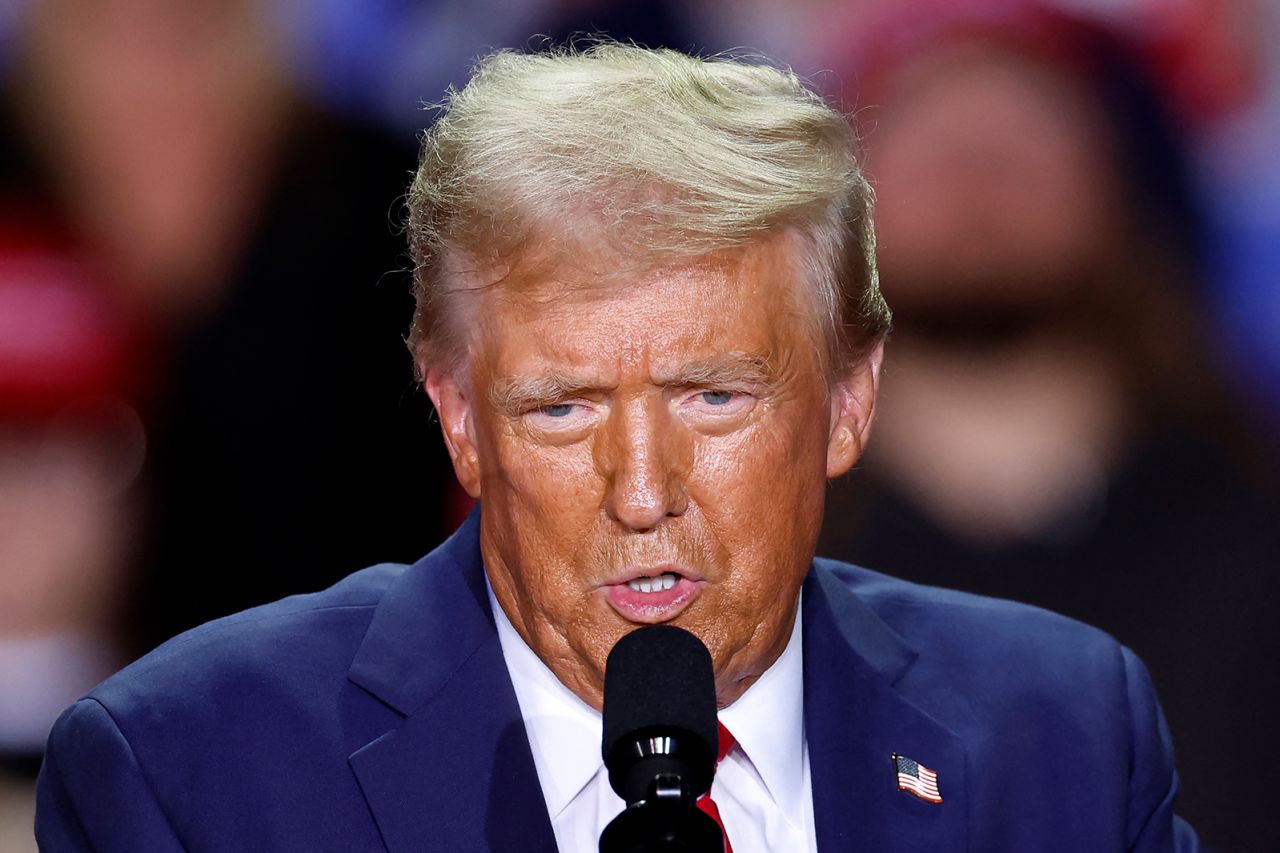
From CNN’s Kate Sullivan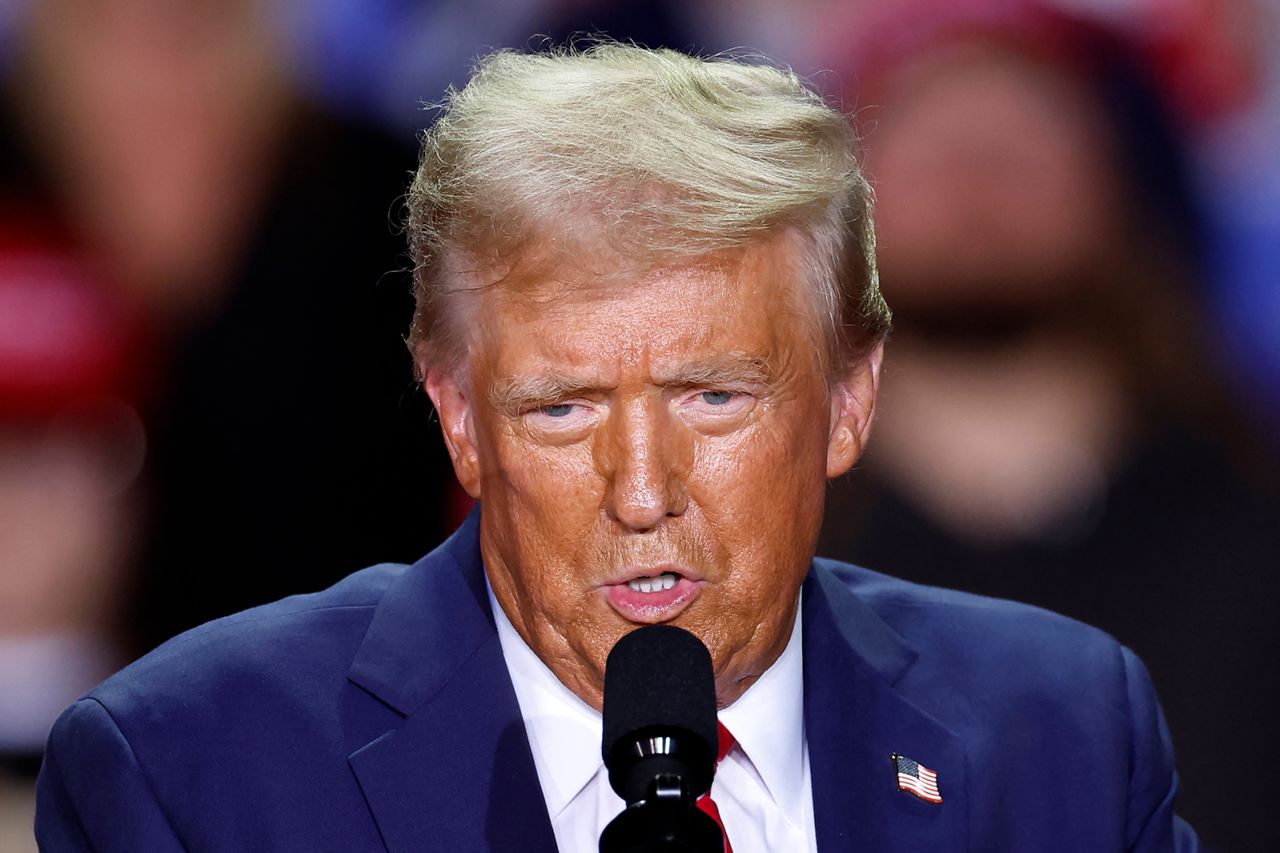
Donald Trump speaks during a campaign rally at Van Andel Arena in Grand Rapids, Michigan on November 5. Kamil Krzaczynski/AFP/Getty Images
Former President Donald Trump argued during the final rally of his campaign that his real opponent this election was not Vice President Kamala Harris but instead “an evil Democrat system.”
“We will defeat the corrupt system in Washington. Because I’m not running against Kamala, I’m running against an evil Democrat system. These are evil people,” Trump said during his rally in Grand Rapids, Michigan, that started well after midnight.
“The silent majority is back and tomorrow you need to get out and vote,” Trump said.
“This has been an incredible journey. And it’s very sad in a way, because, you know, we’ve done all these, and this is the last one, but here’s the good news, all we were doing is putting ourselves in a position to win, which we can do tomorrow very easily if we show up,” he added.
It’s decision day in America. Here’s what to watch for
From CNN’s Eric Bradner and Gregory Krieg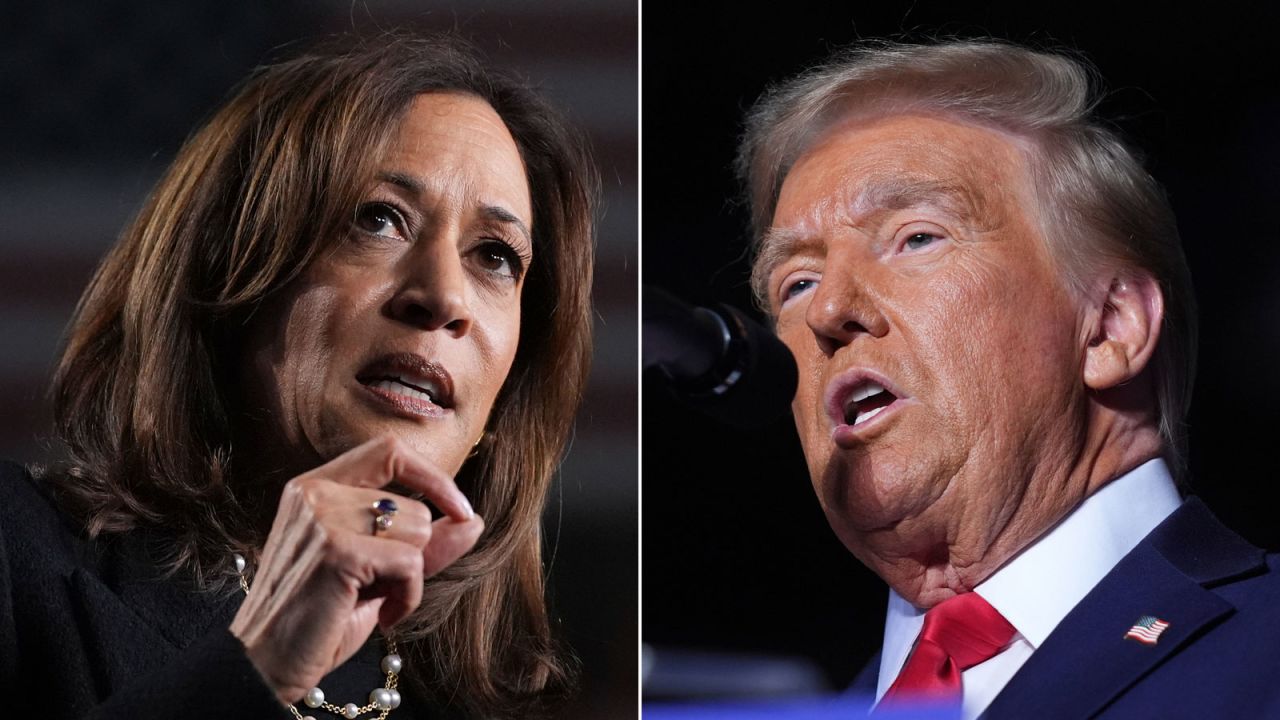
Vice President Kamala Harris and former President Donald Trump. AP
It’s decision day for voters in America’s battle for the White House and control of Congress — even if the results could take days or weeks to sort through.
Vice President Kamala Harris and former President Donald Trump are hoping to win over seven swing states: Michigan, Pennsylvania and Wisconsin, the three Great Lakes states that make up the “blue wall” that Trump cracked in 2016 but President Joe Biden carried in 2020, and Arizona, Georgia, Nevada and North Carolina, the four Sun Belt battlegrounds.
While the election of either candidate would be historic, there’s much more being decided Tuesday, including five states — Arizona, Florida, Missouri, Nebraska and South Dakota — voting on whether to turn back abortion bans with constitutional amendments.
Republicans hope to take advantage of a favorable Senate map, with Democrats defending seats in the red-leaning states of Montana, Ohio and West Virginia. The party’s hopes of holding onto its narrow House majority winds from the coast of Maine through New York’s Hudson Valley, the rolling hills of Virginia’s Piedmont, a “blue dot” in Nebraska and into California’s Orange County, where the political ebbs and flows of the Trump era have been on vivid display.
The initial results in the hours after polls close might not be determinative. States decide their own election procedures, and the order in which states count early, mail-in and Election Day votes varies across the map — as does how quickly certain cities, counties and regions report their results.
Read more about what to expect from the day.
Trump finishes final campaign rally after speaking for nearly 2 hours
From CNN’s Jessie Yeung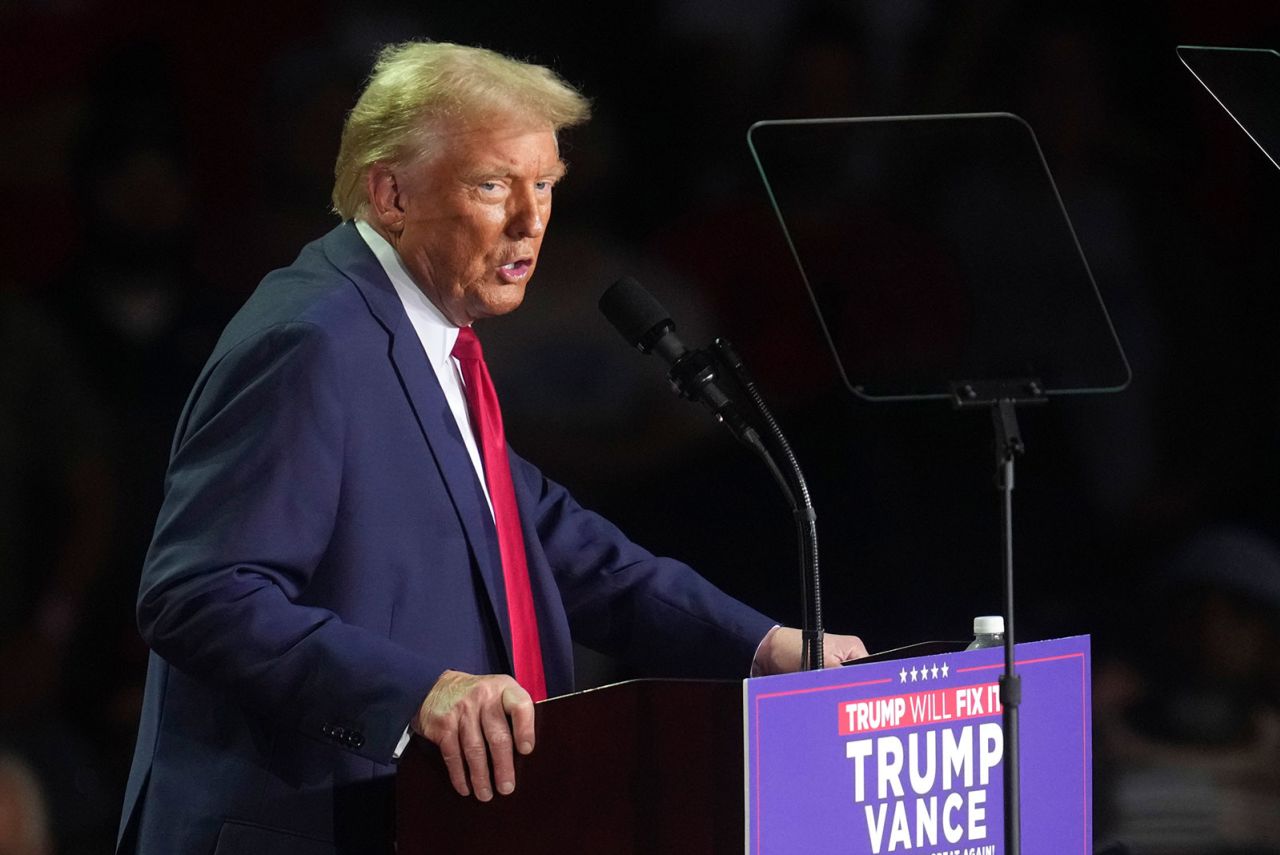
Trump speaks at a campaign rally in Grand Rapids, Michigan on Tuesday. Paul Sancya/AP
Former President Donald Trump has ended his final campaign rally after speaking for nearly two hours in Grand Rapids, Michigan.
He repeated many of his campaign promises, such as vowing to impose hefty tariffs and to crack down on illegal immigration.
At one point he also brought several of his children and their spouses to the stage, who delivered brief remarks, including Tiffany, Eric and Donald Jr.
His marathon address ends a long campaign trail — with Trump saying he had attended more than 900 rallies this year.
Walz says he’s disappointed but not surprised the race is so closely contested
From CNN’s Aaron Pellish
Minnesota Gov. Tim Walz participates in an interview with Stephen Colbert. The Late Show with Stephen Colbert/CBS
Minnesota Gov. Tim Walz said he’s disappointed the race between Vice President Kamala Harris and former President Donald Trump is so closely contested.
In an interview on CBS’ “The Late Show with Stephen Colbert” taped in Bucks County, Pennsylvania last Thursday, Walz laid out the contrast between the two candidates to show that the difference is “stark.”
He said of the election being so closely contested: “It disappoints me, I think, because I think that the choice is so stark, but it’s not surprising.”
“The country’s really divided. There’s been a group of people out there who figured that out, and I think they’ve done a wonderful job of making people think it doesn’t matter, everybody’s the same,” Walz said.
Walz then laid out how he saw the differences between Harris and Trump, particularly noting insults directed toward Puerto Rico made by a speaker at a Trump rally in October.
“In this case, you’ve got the Constitution versus not the Constitution. You’ve got reproductive rights versus I don’t care if you like it or not. I’ll tell you what to do, from Donald Trump in closing with insulting people. I know we’re sitting in Pennsylvania, there’s — there’s 500,000 Puerto Ricans here, and Puerto Ricans, as all Americans, are very proud of where they come from,” he said.
In the past, Walz has expressed some disbelief at the competitiveness of the presidential election. He has regularly mused at private fundraisers and campaign stops that “I’ll go to my grave not understanding” how the election is so close.
Arizona Senate candidate Kari Lake says “silent majority” will back her and Trump
From CNN’s Veronica Stracqualursi
Kari Lake speaks at a campaign rally, Monday, November 4, in Prescott, Arizona. Julio Cortez/AP
Arizona Republican Senate candidate Kari Lake has held her final campaign rally, telling supporters that on Tuesday they have “a chance to change the trajectory of this country and save this Republic.”
Campaigning on the steps of the Yavapai County Courthouse in Prescott, Arizona on Monday — where US Sen. Barry Goldwater of Arizona launched his presidential campaign — Lake, a former TV newscaster up against Democratic Rep. Ruben Gallego in a key Senate race, argued that the “Make America Great Again” movement “is not dead,” and claimed that a “silent majority” will back her and former President Donald Trump tomorrow.
Lake and Gallego, a Marine veteran who represents Arizona’s 3rd congressional district, are vying for the pivotal Senate seat held by independent Sen. Kyrsten Sinema.
Lake, who did not concede her 2022 election loss and promoted Trump’s false theories about the 2020 election, said she believes in “fair and honest elections” and argued “I really believe that our Founding Fathers never envisioned we’d have elections that are run so horribly.”
“That’s why they never put in term limits because they figured we’d be able to vote the people that we didn’t respect out of office. And unfortunately, we haven’t been able to do that. And we’re going to change that after January. But the only way to change that is to show up in such a massive movement that we have their heads spinning,” she said, pointing to the media.
She also thanked GOP congressional candidate Abe Hamadeh and said: “When they did to us what they did to us in 2022, and everyone else ran and hid, guess who stood with me and said, damn it, we’re going to fight — Abe Hamadeh.”
She argued the election is not “Republican-Democrat anymore” but “Americanism versus communism.”
Trump teases using sexist language to refer to Nancy Pelosi
From CNN’s Jessie Yeung
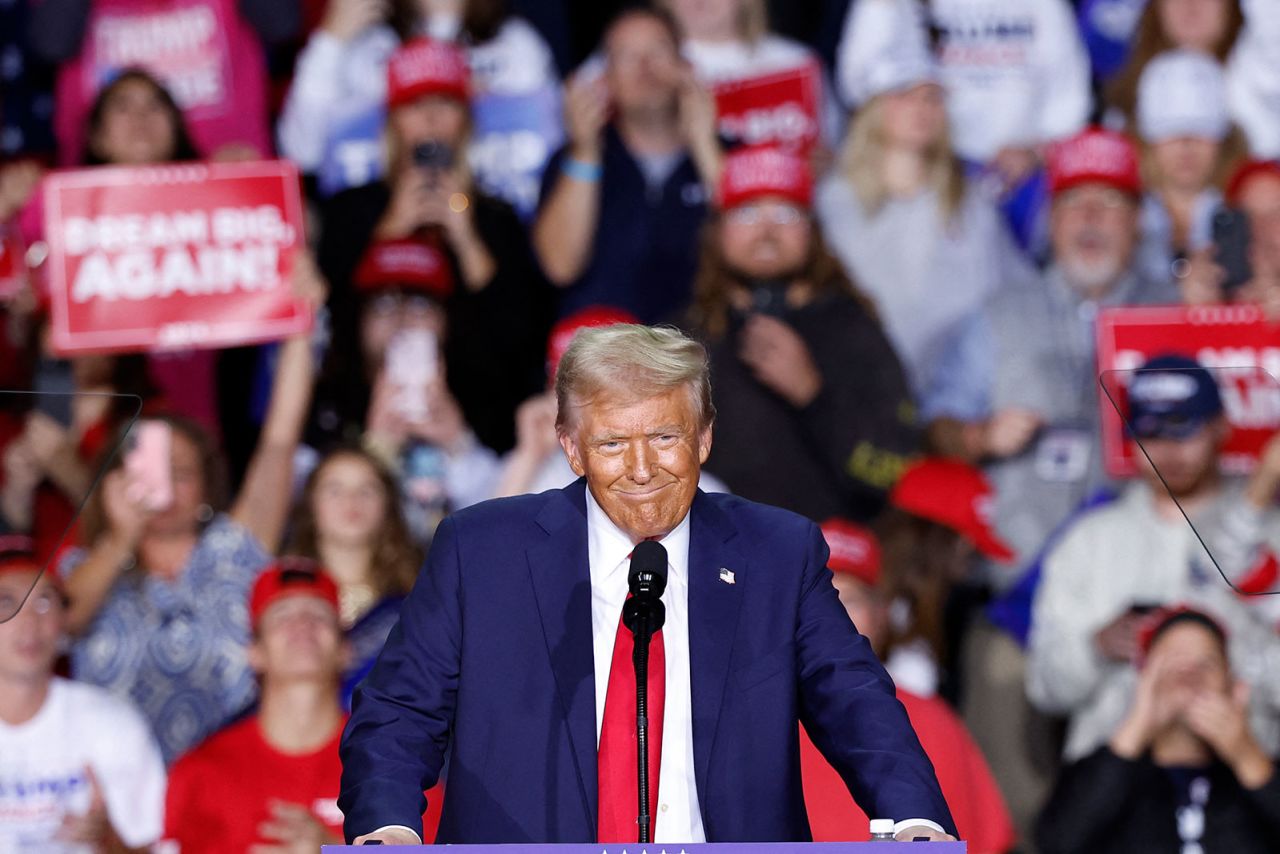
Former President Donald Trump speaks during a campaign rally in Grand Rapids, Michigan on Tuesday, November 5. Kamil Krzaczynski/AFP/Getty Images
Former President Donald Trump slammed US Rep. Nancy Pelosi during his final rally in Grand Rapids, Michigan, verging on using a profanity to describe the former House Speaker.
“She’s a crooked person, she’s a bad person. Evil, she’s an evil, sick, crazy bi— It starts with a ‘B’ but I won’t say it. I wanna say it,” Trump said to cheers from the crowd.
“I don’t use much (foul language), you know, every once in a while, and it’s never a real bad word, it’s never bad … But it is a little better when you use foul language. These are bad people,” he said.
Trump constantly rails against Pelosi and recently called the California Democrat “an enemy from within.”
Throughout the end of his campaign trail, Trump’s message has gotten increasingly dark and often offensive. At an event in North Carolina last week, Trump chuckled approvingly at an audience member’s suggestion that Vice President Kamala Harris worked as a sex worker.
Harris will spend Election Day doing radio interviews
From CNN’s Brian Rokus
Vice President Kamala Harris will spend Election Day in Washington, DC and participate in radio interviews, according to her office.
Trump has held his final campaign rally in Grand Rapids in 3 presidential races
From CNN’s Jessie Yeung
Former President Donald Trump has taken the stage in Grand Rapids, Michigan — giving the city a special shout-out for being the location of his final rallies in past presidential campaigns.
“I want to say a very special hello to Grand Rapids, it’s been a special place, remember 2016?” he said to a cheering crowd that chanted his name.
Trump previously also finished his campaign trail in the city in 2016 and 2020.
NOW: Trump is speaking at his final rally in Grand Rapids, Michigan
From CNN staff
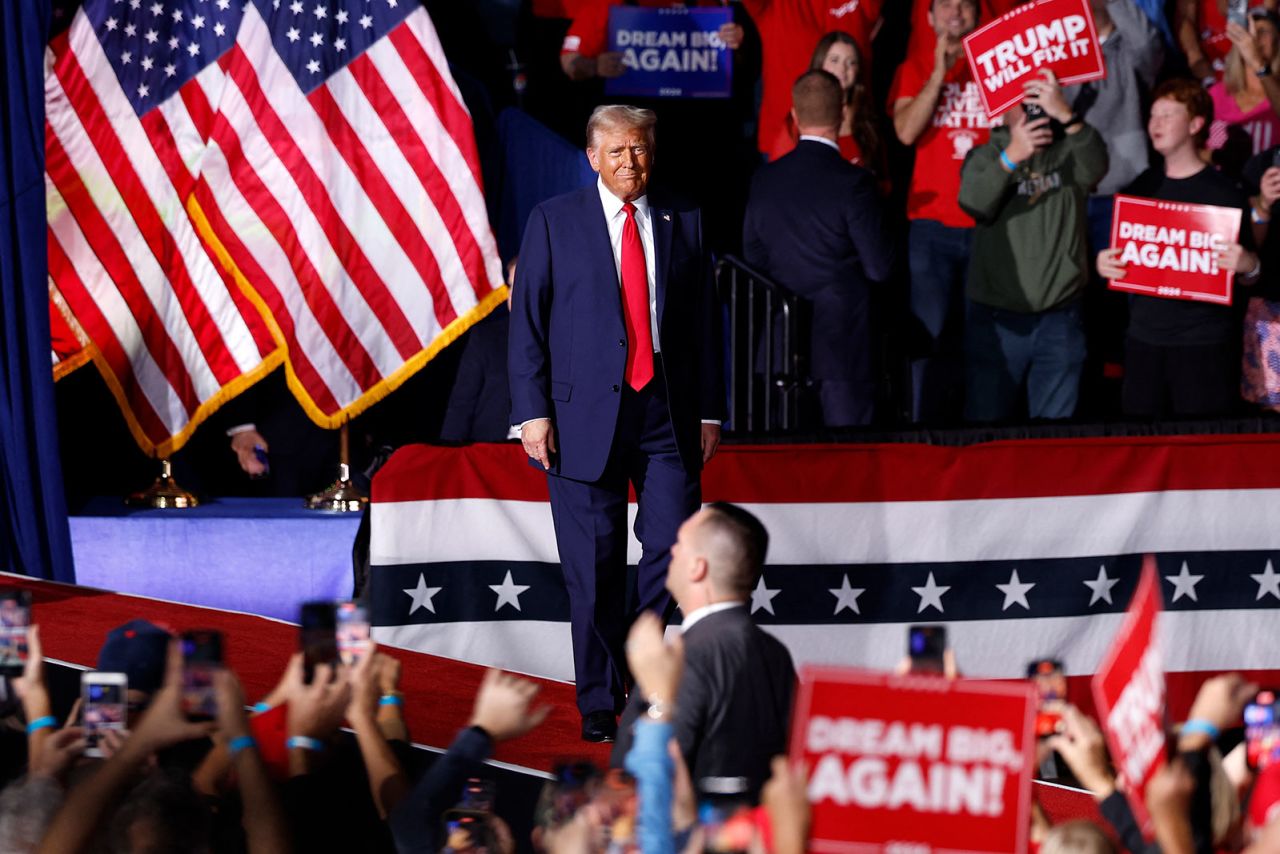
Former President Donald Trump walks on stage for his final campaign rally in Grand Rapids, Michigan on Monday, November 4. Kamil Krzaczynski/AFP/Getty Images
Former President Donald Trump is speaking at his final rally in Grand Rapids, Michigan, where he ended both his 2016 and 2020 campaigns. His remarks were originally slated for 10:30 p.m. ET.
Grand Rapids is a Western Michigan city in Kent County, which swung from Trump in 2016 to Joe Biden in 2020.
Harris and Trump tie in Dixville Notch midnight vote to kick off Election Day
From CNN’s Gary Tuchman
Video Ad Feedback
00:52 – Source: CNN
Vice President Kamala Harris and former President Donald Trump have tied with three votes each in the tiny New Hampshire township of Dixville Notch, kicking off Election Day in one of the first places in the country to report its presidential preference.
Four Republicans and two undeclared voters participated.
The unincorporated township, located along the US-Canada border in New Hampshire’s northern tip, opened and closed its poll just after midnight ET in a tradition that dates back to 1960.
Read more about how Dixville Notch voted.
Harris calls on Pennsylvania voters to turn out, saying “the race ain’t over yet”
From CNN’s Jessie Yeung
Vice President Kamala Harris speaks during a campaign rally in Philadelphia, Pennsylvania, on Monday, November 4. Hannah McKay/Reutes
Speaking at her final campaign rally in Philadelphia before Election Day on Monday night, Vice President Kamala Harris said her team was “optimistic and excited” — but urged voters to make their voices heard, saying Pennsylvania could “decide the outcome” of the election.
“The race ain’t over yet, and we must finish strong. This could be one of the closest races in history. Every single vote matters,” she said.
“With only a few hours left, we still have work to do, and as you’ve heard me say before, we like hard work,” she added.
At points, the crowd broke into cheers of “We will win” and “We’re not going back.”
Harris reiterated several campaign promises, such as lowering the cost of living, housing, childcare, elderly home care, and taxes for workers and small businesses. She also vowed to pass a bill to restore reproductive freedoms after the rolling back of Roe v. Wade.
She sought to contrast herself with Donald Trump by using several familiar refrains — such as promising a seat at the table to those who disagree with her, compared to the former president’s often vehement rhetoric against his political opponents.
“We started this campaign 107 days ago,” she said. “From the beginning, ours has not been a fight against something, it has been a fight for something. A fight for a future with freedom, with opportunity, and with dignity for all Americans.”
“Tonight, we finish as we started — with optimism, with energy, with joy, knowing that we the people have the power to shape our future, and that we can confront any challenge we face when we do it together.”
NOW: Harris speaking in Philadelphia in final rally before Election Day
From CNN staff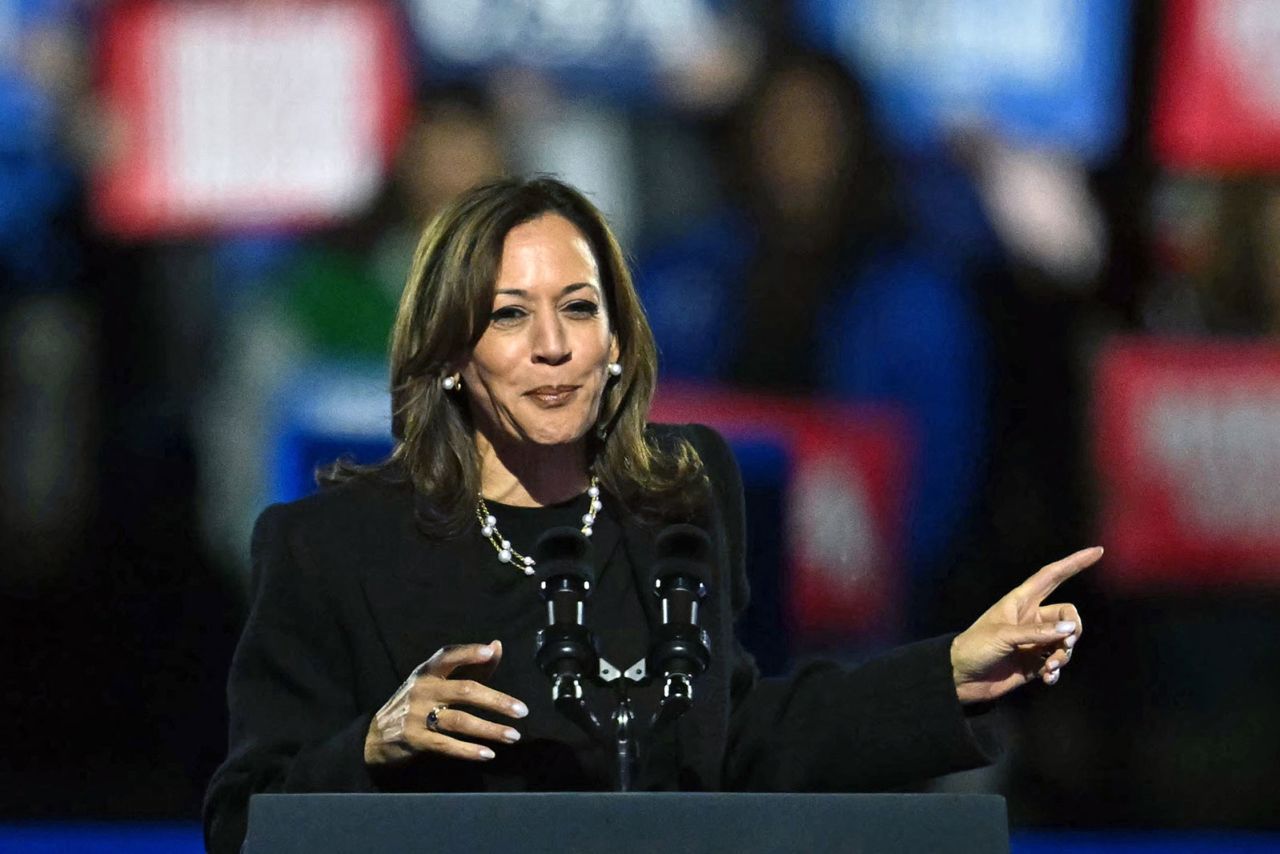
Vice President Kamala Harris speaks during a campaign rally in Philadelphia, Pennsylvania on Monday,November 4. Angela Weiss/AFP/Getty Images
Vice President Kamala Harris is speaking at a rally in Philadelphia, her final stop in front of voters before Election Day.
Harris has made the key battleground of Pennsylvania her priority on Monday with several stops across the state culminating in her final one in the state’s largest city.
She was joined by Oprah Winfrey and Lady Gaga, among other celebrities, musicians and elected officials at the famous “Rocky Steps” at the Philadelphia Museum of the Arts.
Oprah takes the stage at Harris rally with 10 first-time young voters
From CNN’s Jessie Yeung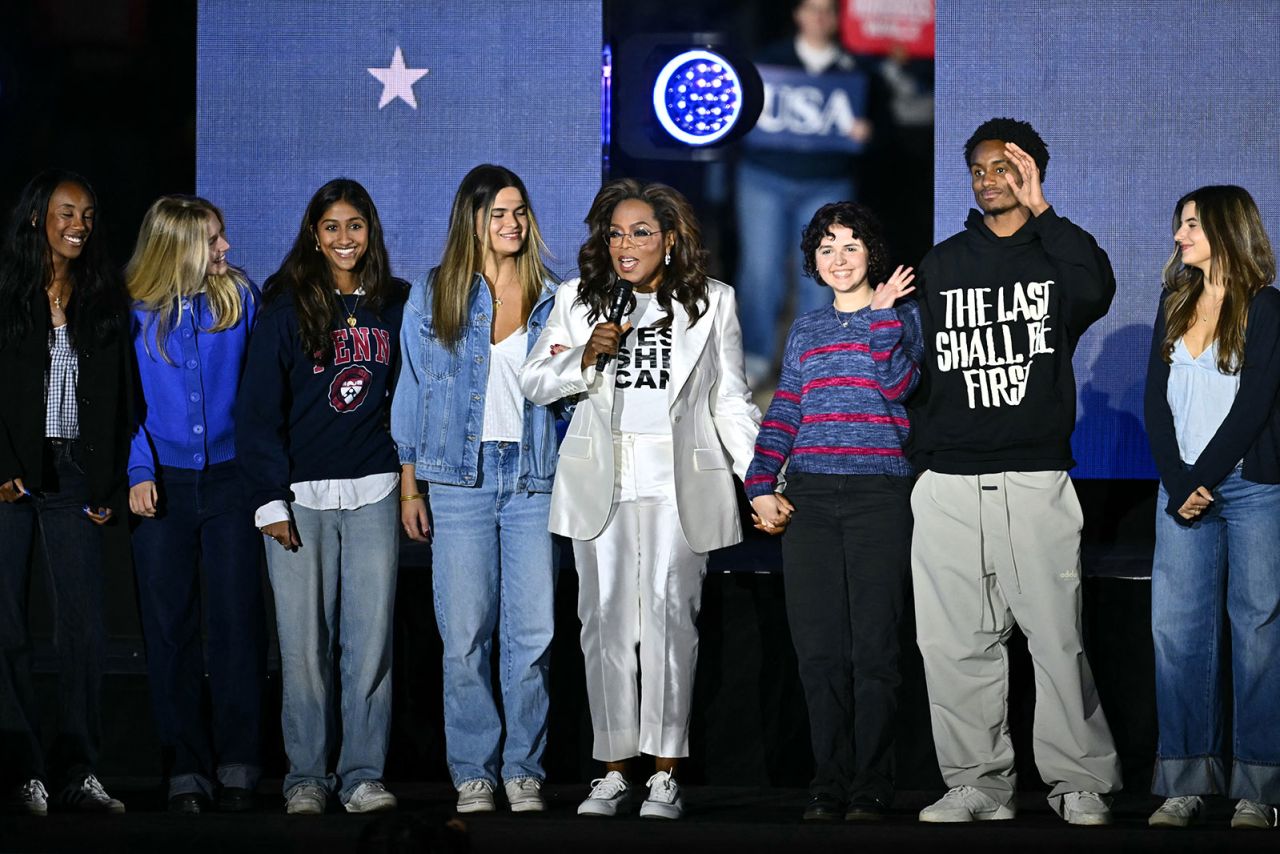
US television producer Oprah Winfrey arrives on stage with 10 first-time Philadelphia voters during a rally for Kamala Harris in Philadelphia, Pennsylvania, on November 4, 2024. Angela Weiss/AFP/Getty Images
Oprah Winfrey took the stage at Kamala Harris’ final rally in Philadelphia on Monday night alongside 10 young people – all first time voters.
“The policies that Kamala Harris has proposed for women’s reproductive rights and education equality are what led me to cast my ballot for her,” one voter told Winfrey.
Another first-time voter said it was especially significant for him as an African American to “exercise my right to vote, which my ancestors fought so hard for.”
“We don’t get to sit this one out,” Oprah said.
“If we don’t show up tomorrow, it is entirely possible that we will not have the opportunity to ever cast a ballot again.”
“We are voting for healing over hate,” she said.
“What you can do for your country, what you can do for democracy here, and what you can do for the spirit of John Lewis and all the others who dared to walk across that bridge in Selma and fight for justice for us all … What you can do for every pregnant young woman who has died bc she was not eligible to receive the emergency medical care she desperately needed bc of an abortion ban, what you can do for everyone and everything you cherish — is vote.”
Lady Gaga performs “God Bless America” at Harris’ final rally in Philadelphia
From CNN’s Jessie Yeung
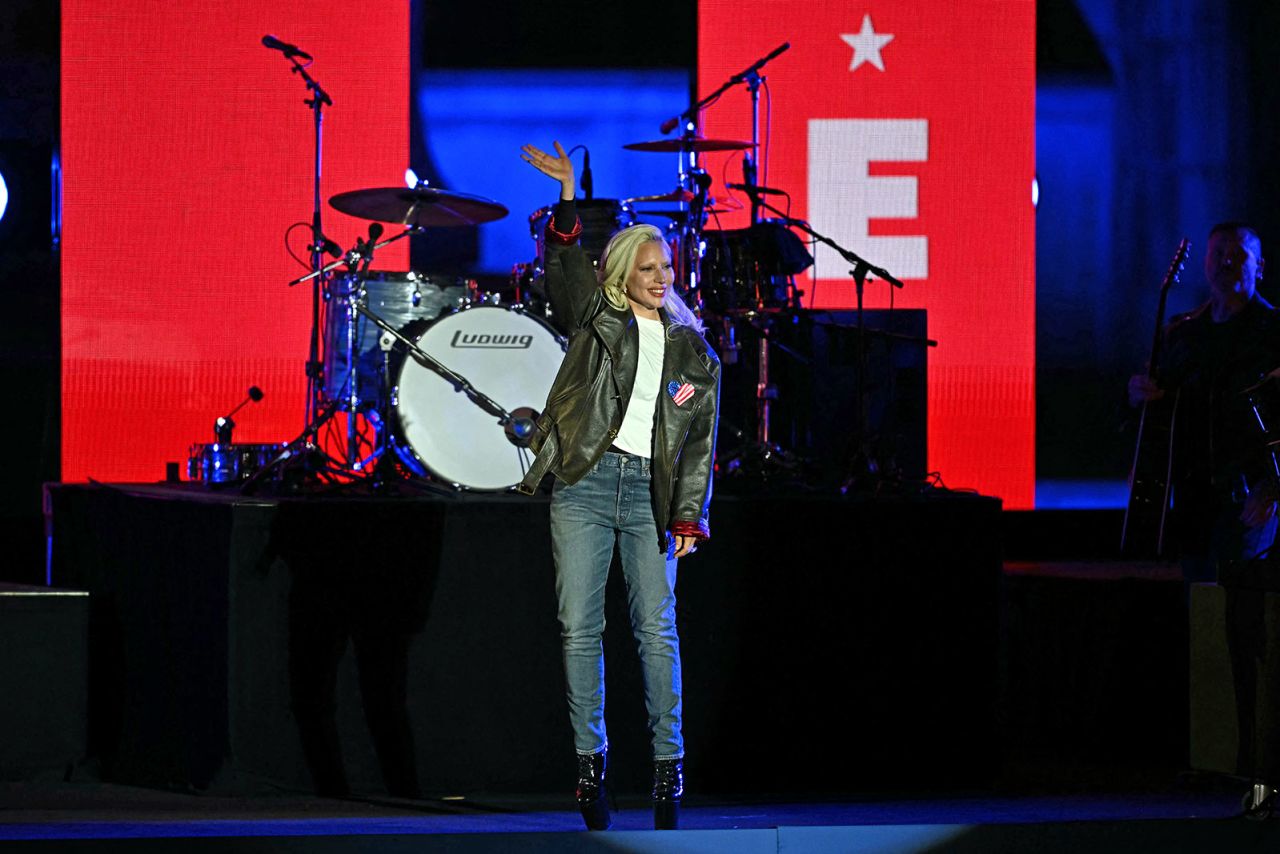
Lady Gaga waves before performing during a campaign rally for Vice President Kamala Harris in Philadelphia, Pennsylvania on Monday, November 4. ( Angela Weiss/AFP/Getty Images
Musical superstar Lady Gaga appeared at Vice President Kamala Harris’ final rally in Philadelphia, performing a rendition of “God Bless America.”
“For more than half of this country’s life, women didn’t have a voice. Yet we raised children, we held our families together, we supported men as they made the decisions,” she said in brief remarks after her performance. “But tomorrow, women will be a part of making this decision.”
Oprah Winfrey is also expected to make an appearance tonight, before Harris delivers remarks.
Walz focuses on abortion during final campaign rally in Michigan
From CNN’s Aaron Pellish
Minnesota Gov. Tim Walz focused heavily on access to abortion and reproductive health care, driving home a core message of Vice President Kamala Harris’ campaign in Detroit, Michigan on Monday.
In his remarks at Hart Plaza overlooking the Detroit River, Walz reiterated his attacks on former president Donald Trump, who claimed to be the “protector” of women and said he would look after women “whether they like it or not” at a campaign rally in Wisconsin last week.
He also made a direct pitch to male voters on abortion, asking them to consider the implications of abortion restrictions on the women in their lives.
“Let me speak to the guys in the crowd tonight. I want you to think about the women in your life that you love. Their lives are at stake in this election. Donald Trump appointed those Supreme Court justices who repealed Roe versus Wade, and he brags about it. He is glad that those women you’re thinking about and you love have fewer rights than their mothers and their grandmothers,” he said.
“We’re seeing women turned away from emergency rooms, miscarrying in parking lots, whether they like it or not. Survivors of rape being forced to carry those pregnancies to term, whether they like it or not. Fertility clinics turning couples away at the door, whether they like it or not,” he said.
“Now, tomorrow, women all across America of every age, both parties, are going to send a loud and clear message to Donald Trump, whether he likes it or not.”
Harris offers Americans a chance to turn the page on Trump — without mentioning him
From CNN’s Gregory Krieg
Vice President Kamala Harris appears during a campaign rally in Pittsburgh, Pennsylvania, on Monday, November 4. Quinn Glabicki/Reuters
Her message has been consistent, but Kamala Harris has in the closing days of the presidential race dropped two notable words from her stump speech: Donald Trump.
The former president’s name was again absent from the vice president’s speech on Monday night in Pittsburgh, where she again promised voters a clean break from the discord of the Trump era in American politics. It was a notable switch in rhetoric for the vice president, who had mentioned Trump’s name so often in previous versions of her stump speech that the Republican’s campaign had put together a video compilation of Harris saying “Donald Trump” that he often played at rallies.
“We have an opportunity in this election to finally turn the page on a decade of politics driven by fear and division. We are done with that,” Harris said. “We’re done. We’re exhausted with it.”
That promise has been threaded through her campaign, usually implied but increasingly delivered in explicit terms.
“It can be easy to forget a simple truth,” Harris said in Washington. “It doesn’t have to be this way.”
The way it is, she said in Pittsburgh, is not so good.
“So much about these last several years has been about trying to make people point their fingers at each other,” Harris said, “to have Americans point their fingers at each other, to try and make people feel alone or feel small.”
Elon Musk cancels virtual town hall event minutes after it started after technical problems
From CNN’s Clare Duffy
Elon Musk held a digital version of the town-hall-style rallies he has hosted on behalf of former President Donald Trump. But the event on X ended just a few minutes after it started on Monday night, when Musk encountered technical difficulties.
The event began streaming more than 20 minutes after its scheduled 8 p.m. ET start time. When the billionaire X owner joined, he promoted a podcast interview he did with Joe Rogan and offered to take questions. An operator then attempted to take questions from four listeners who apparently had been on hold, but the line went silent when he called on them.
The operator asked Musk if he believes “we will win” on Tuesday — presumably referring to Trump, whom Musk has supported to the tune of tens of millions of dollars.
“Well, I think if people vote tomorrow, we’re definitely going to win,” he said.
Musk then called off the event, saying: “let’s cancel this, since we seem to be having some technical issues.” Musk promised to start a regular livestream spaces event on X. The X Spaces event Musk started immediately following the town hall, lasted one minute and appeared to have no audio.
Minutes later, Musk said he would not restart his Q&A and encouraged followers to listen to his Rogan interview instead, during which the podcaster endorsed Trump.
The Monday town hall is just the latest election-related event that Musk attempted to host on X that was plagued by technical difficulties.
An August interview between Musk and Trump that was streamed on X was delayed by more than 40 minutes because of glitches. Musk blamed the issue on a cyberattack, but some experts speculated it was simply caused by too many users trying to listen. A similar event last year to kick off Florida Gov. Ron DeSantis’ presidential campaign was also delayed by 25 minutes and marred by technical difficulties.
Why these 7 battleground states could determine who wins the election
From CNN’s Zachary B. Wolf
People cast their early ballots at a polling station in Grand Rapids, Michigan, on November 2. Carlos Osorio/Reuters
There are thought to be seven states that could conceivably be won by either candidate. As a result, the campaigns have focused their energy in these areas. They can be broken up into two general categories:
3 Midwestern battlegrounds, aka “the blue wall” – These are the manufacturing and union-heavy states of Pennsylvania, Michigan and Wisconsin. They used to be more reliably Democratic but have shifted in recent years as their populations have changed and as former President Donald Trump has appealed to White voters without a college degree.
When Trump won the White House in 2016, he won all three. When President Joe Biden won in 2020, he won all three. If Vice President Kamala Harris wins all three this year, she will likely have the electoral votes to be president. But polls suggest close races in all three. Turnout will be key, which for Harris means appealing to suburban women and Black voters. All three states have urban centers.
The blue wall states usually vote the same way. The last time they did not all go to the same candidate was in 1988 – notably also a year when California was red and West Virginia was blue. In those eight elections since 1988, the only time the blue wall states went to a Republican was in 2016, when they were won by Trump.
4 Sun Belt battlegrounds – These states with growing populations include Arizona and Nevada in the West and North Carolina and Georgia in the East. Arizona, Georgia and North Carolina used to be more reliably Republican. Trump won North Carolina twice, but the margins were close in 2020. The last Democrat to win there was Barack Obama in 2008. Biden was the first Democrat to win Georgia since Bill Clinton in 1992 and Arizona since Clinton in 1996.
Here are more key things to know about the US election works.
Ahead of election night, meet the 2024 Democratic and Republican candidates
From CNN’s Ethan Cohen, Molly English and Matt Holt
Former President Donald Trump and Vice President Kamala Harris. Getty Images
Ahead of election night, read up on the 2024 candidates on the Democratic and Republican tickets vying to win the White House.
Vice President Kamala Harris is the Democratic candidate for president. The daughter of immigrants from India and Jamaica, Harris grew up in Oakland and spent much of her political career in California’s Bay Area.
She was first elected as the San Francisco district attorney in 2004, before later serving as the attorney general of California. After that, Harris was elected to the Senate before being picked to be President Joe Biden’s running mate in the 2020 election.
She announced her own candidacy for the Democratic nomination for president after Biden withdrew from the ticket and endorsed her on July 21. Harris is the first Black woman and first Asian American to lead the ticket of a major political party.
Minnesota Gov. Tim Walz is Harris’ running mate. Before being elected to Congress to represent the state’s 1st Congressional District in 2007, Walz was a high school geography teacher and an assistant football coach. He also served in the Army National Guard. Walz has been serving as Minnesota governor since 2019.
Former President Donald Trump is the Republican candidate for president, aiming to become only the second commander in chief to win two nonconsecutive terms.
Trump, who was born in New York, graduated from the University of Pennsylvania with a bachelor’s degree in economics. Before launching his successful 2016 presidential bid, Trump was a real estate developer, businessman and a reality television star as host of “The Apprentice.”
Ohio Sen. JD Vance is Trump’s running mate. Born in Middletown, Ohio, Vance wrote a memoir, Hillbilly Elegy, about his upbringing and white, working-class Americans. He also attended Yale Law School, worked as a venture capitalist and served in the US Marine Corps.
Vance was elected to the Senate in 2023, outlasting a stronger-than-expected challenge from Democrat Tim Ryan and keeping the seat under GOP control.

US election live: Latest polls show Harris, Trump tied on election eve

Elon Musk’s $1m US voter giveaway to continue, Pennsylvania judge rules

Trump or Harris? Gaza war drives many Arab and Muslim voters to Jill Stein

Joe Rogan endorses Trump on eve of the election

Trump describes US as an occupied country in dark closing message focused on immigration
Trending
-

 The Washington Post7 months ago
The Washington Post7 months agoAre you still registered to vote? How to make sure you’re up to date.
-
Debates8 months ago
Donald Trump Vs Kamala Harris LIVE | The Big 2024 Debate | U.S. Election Latest
-
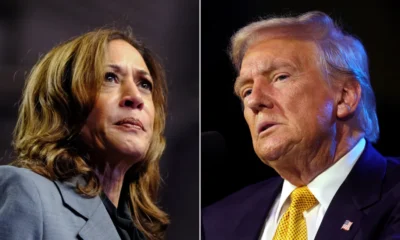
 CNN7 months ago
CNN7 months agoCNN Poll: Harris and Trump are tied in North Carolina, while vice president leads in Nebraska’s 2nd District
-

 CNN7 months ago
CNN7 months agoNew York Democrats are desperate to avoid repeat of their 2022 midterm collapse
-
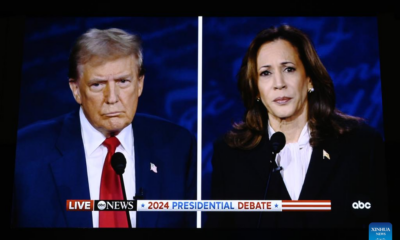
 Donald Trump8 months ago
Donald Trump8 months agoWas Harris’s debate performance enough to win over undecided voters?
-

 Kamala Harris7 months ago
Kamala Harris7 months agoExclusive: Harris to release new economic proposals this week on US wealth creation
-
Debates8 months ago
US election: Blistering exchanges and fact checking in Kamala Harris and Donald Trump debate
-

 CNN7 months ago
CNN7 months agoHarris’ cash edge funds advertising blitz as Elon Musk cuts big check to House Republicans, new filings show
